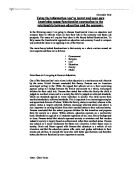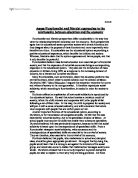However, the need to be able to compete in a global economy is not the only factor taken into consideration in the making of Singapore’s education policies. One of the other influences over Singapore’s education policies is the need to build national loyalty among our young. Students of different races seldom got to meet one another as most people sent their children to mother tongue-based schools – this posed difficulties in developing national loyalty and social cohesion as the people did not identify themselves as one people. There was an urgent need to change this, and to resolve the issue, common practices such as compulsory participation in flag-raising and pledge-taking ceremonies every morning were introduced. Activities were also organised between schools of different language streams to bring the students of different races together.
As Singapore is a multi-racial society, a major factor was the need to foster social cohesion in order to avoid racial conflicts of the earlier years, which resulted in riots, curfews and deaths. In 1960, the government introduced the integrated school system, where pupils and teachers from different races would be in the same school. This encouraged interaction between pupils and teachers of different races, thus promoting racial harmony. In 1966, bilingualism was made compulsory for all pupils in Secondary 1 – pupils were required to learn English and their Mother Tongue. With the introduction of bilingualism, the importance of the mother tongue was recognised, and it was used to impart and inculcate the moral values and traditions of each race into the pupils. As a result, pupils had a greater awareness of their own cultural roots. English was also important – it functioned as a link between the different races as it was a common language which everyone understood. This improved communication amongst the various races, helped to break down racial barriers and build a more harmonious society. In 1997, National Education (NE) was formally introduced in all aspects of school life, ranging from discussion during lessons to celebration of events such as Racial Harmony Day and Total Defence Day. NE fosters strong bonds among pupils of different races as they each get to learn about and appreciate the diverse and rich cultures of each race. It also teaches them responsibility and commitment to family, community and country.
In conclusion, I agree, to a large extent, with the statement that Singapore’s education policies are largely influenced by the need to compete in a global economy. It is the overriding and most important factor taken into consideration in the making of our education policies. To be able to compete on the global stage, in a global economy, alongside much bigger and more powerful countries such as the United States of America and Japan, to be able to stand our ground in the face of the rising economic power of China, it is vital that Singapore have a well-educated workforce, a workforce equipped with the necessary skills such as IT skills, creative problem solving skills and critical thinking skills. However, in a society of chaos and anarchy, an efficient workforce is useless. A stable and harmonious society, where people of different races stand together and identify themselves as one, is important too. If there ever was a workforce that was outdated and did not know how to communicate with the rest of the world, even if there was a peaceful and harmonious society, the country would never be able to establish itself on the global stage. In view of this, Singapore’s education policies, which greatly affects the quality of the Singapore workforce, is an extremely important factor in allowing Singapore to compete in a global economy, and are thus largely influenced by that same need.
b) Do you agree that the multi-lingual policy in Swiss schools helps to create the Swiss identity? Explain your answer. [13m]
I agree to a large extent.
Switzerland is, like Singapore, a multi-racial country. It is made up of people speaking 4 different languages, German, French, Italian and Romansh. In order to communicate effectively with one another, most Swiss schools have introduced policies of multi-lingualism. As a result, most pupils are taught at least 3 languages – English, their own ethnic language and another language of the federation. Each different language speaking region has a different official language of instruction in schools – this preserves and promotes the national languages in each different territory and creates diversity amongst the pupils from different language speaking regions, while English serves as a common language for the citizens to communicate with one another. Through the learning of another ethnic language, pupils are able to understand and appreciate the culture of that particular race and language, and appreciate the diversity in cultures of different races. This is the one part of the Swiss identity – unity and harmony in the midst of diversity, living harmoniously even though they speak different languages and are from different races, united by one fact – that they are Swiss.
Social education is also an important part of the multi-lingual policy in Swiss schools, and also helps to create the Swiss identity. Local history and traditions, customs, rites, folk stories and proverbs are taught to the pupils. This instills pride in the different cultures (or the ‘Swiss’ culture) and inculcates a sense of rootedness to the country. Pupils build very strong bonds with the school through sports, school outings, project work and student organisations and the strong bonds are then extended to the community. Schools instill in pupils a sense of belonging and pride for the community, and it is not a surprise to see pupils doing community service work even though it is not compulsory. As a result of this high emphasis on social education, the Swiss identity in pupils is thus created.
Swiss schools help to prepare pupils for the way of life in the cantons by reinforcing the values and attitudes of a good and responsible citizen. One way is by giving pupils practice in decision-making. Just like adults members of a canton decide on community matters, teachers and pupils also play a part in the school’s decision-making process. In this way, pupils are better prepared to participate responsibly in the democratic processes of the country. As such, pupils are aware of the democratic processes of the country as well as their rights and will, in future, play a proactive role in decision-making of the canton and the country. In this manner, the Swiss identity is also strengthened in pupils.
Vocational training, an important causal factor in the resultant high quality of the Swiss workforce, is an aspect that was always been emphasised upon in the Swiss education system. When Swiss pupils complete their compulsory education, they decide whether to go to university or to enter one of the many vocational training schools. 7 out of 10 pupils choose to go to vocational training schools, thereby ensuring that the Swiss industry is not lacking in well-trained young workers and technicians. At the end of their vocational training, or apprenticeship, pupils obtain a certificate of competence in his/her particular trade. These certificates are highly valued in Switzerland, and with the large number of pupils possessing such certificates, the Swiss can be confident that their reputation and achievements in the various fields such as banking, engineering, food and nutrition, hospitality management, pharmaceuticals, technology and quality craftsmanship will be upheld. The Swiss identity of quality and excellence in the service sector is thus created and enhanced.
In conclusion, I agree to a large extent that the multi-lingual policy in Swiss schools helps to create the Swiss identity. The multi-lingual policy enables Swiss pupils to effectively communicate with each other, no matter which canton or region they come from, by breaking down the language barrier. The knowledge of an ethnic language also enhances the desired effect of social education, causing the pupil to even better understand and appreciate the culture of another ethnic language. Social responsibility is also critical in the creation of the Swiss identity, but the creation of a harmonious society in Switzerland as a result of multi-lingualism and a better understanding of the different diverse cultures is the most important. For harmony equals unity, and only with unity can there be the Swiss identity.







